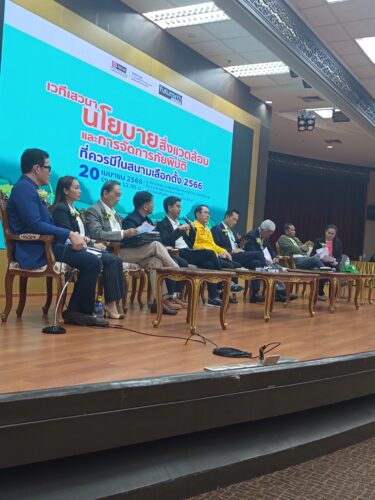Thailand National Committee Discusses Roles of Political Parties for Disaster Management
 On 20 April 2023, a seminar was held at Thailand’s National Institute Development Administration (NIDA) to discuss the role of political parties in addressing environmental issues and disaster management in the country. The seminar focused on several key themes, including the clean air act, climate change, flooding, tsunami, chemical hazardous wastes and clean energy. Several environmental organizations and members from different political parties participated, including Dr. Plodprasop Suraswadi (Pheu Thai Party), Dr. Dejrat Sukkamnerd (Move Forward Party), Ms. Pada Vorakanon (Bhumjaithai Party), Mr. Chaiwut Thanakamanusorn (Palang Pracharath Party), Mr. Sita Tiwari (Thai Sang Thai Party), Mr. Warong Dechkitvikrom (Thai Phakdee Party), Prof. Dr. Kanok Wongtrangan (Chartthaipattana Party), Mr. Pongsa Chunam (Green Party), and Jarupon Reungsuwan (Pheu Chart Party).
On 20 April 2023, a seminar was held at Thailand’s National Institute Development Administration (NIDA) to discuss the role of political parties in addressing environmental issues and disaster management in the country. The seminar focused on several key themes, including the clean air act, climate change, flooding, tsunami, chemical hazardous wastes and clean energy. Several environmental organizations and members from different political parties participated, including Dr. Plodprasop Suraswadi (Pheu Thai Party), Dr. Dejrat Sukkamnerd (Move Forward Party), Ms. Pada Vorakanon (Bhumjaithai Party), Mr. Chaiwut Thanakamanusorn (Palang Pracharath Party), Mr. Sita Tiwari (Thai Sang Thai Party), Mr. Warong Dechkitvikrom (Thai Phakdee Party), Prof. Dr. Kanok Wongtrangan (Chartthaipattana Party), Mr. Pongsa Chunam (Green Party), and Jarupon Reungsuwan (Pheu Chart Party).
Distinguished scholars from different multidisciplinary fields including public political sciences (Assoc. Prof. Dr. Pichai Rattana Dilok na Phuket; Graduate School of Social Development and Management Strategy (GSSDMS), National Institute of Development Administration (NIDA)), chemical engineering (Assoc. Prof. Dr. Weerachai Phuttawong; Krasetsart University), environmental sciences (Mr. Sonthi Kotchawat, Thailand Environment Institute Foundation), civil engineering (Assoc. Prof. Dr. Kuaanan Techato; Faculty of Environmental Management, Prince of Songkla University and Future Earth Thailand), remote sensing (Thailand’s Geo-Informatics and Space Technology Development Agency (GISTDA) and Future Earth Thailand), air pollution (Prof. Dr. Siwatt Pongpiachan; Graduate School of Social Development and Management Strategy (GSSDMS), National Institute of Development Administration (NIDA) and Future Earth Thailand), and public participation (Mr. Tara Buakamsri; Green Peace Thailand) were invited to discuss questions including:
How are political parties responding to the idea of Thailand Clean Air Act?
The seminar highlighted the issue of air pollution in Thailand, and how it affects public health. The Clean Air Act was proposed as a solution that would set standards for air quality and regulate emissions from vehicles, agricultural business and industries.
What about the policies related to climate change?
Participants discussed the importance of reducing greenhouse gas emissions to mitigate the negative impacts of climate change. Political parties were urged to take action to promote renewable energy and shift towards a low-carbon economy. The Carbon Border Adjustment Mechanism (CBAM) is a proposed policy by the European Union to address the issue of carbon leakage, which occurs when companies move their operations to countries with lower emissions standards to avoid the cost of carbon pricing. The CBAM would place a carbon price on imported goods based on their carbon footprint, similar to the existing emissions trading system for EU-based companies. This would create a level playing field for domestic and imported goods, and incentivize companies to reduce their greenhouse gas emissions. The CBAM is currently under development and would require approval by the EU member states and the European Parliament before becoming law.
What are the action plans and preparation processes for flooding and tsunamis?
The seminar pointed out the vulnerability of Thailand to natural disasters such as flooding and tsunamis, and how they are exacerbated by climate change. Participants emphasized the need for better disaster management and emergency response systems.
How can the political parties launch the most effective policies for reducing air pollution problems in Thailand?
The seminar examined the sources of air pollution in Thailand, such as transportation and industrial activity. Participants highlighted the need for innovative solutions such as electric vehicles, renewable energy and waste.
Banner image: Qimono/Pixabay
DATE
April 26, 2023AUTHOR
Prof. Dr. Siwatt PongpiachanSHARE WITH YOUR NETWORK
RELATED POSTS
International Day of Clean Air for Blue Skies
Global Distributive Justice and Systemic Transformations Key to Planetary Stability, Study Finds
2022 ECRs in Sustainability Science Webinar: Technology for Cooking-oil Fume Purification